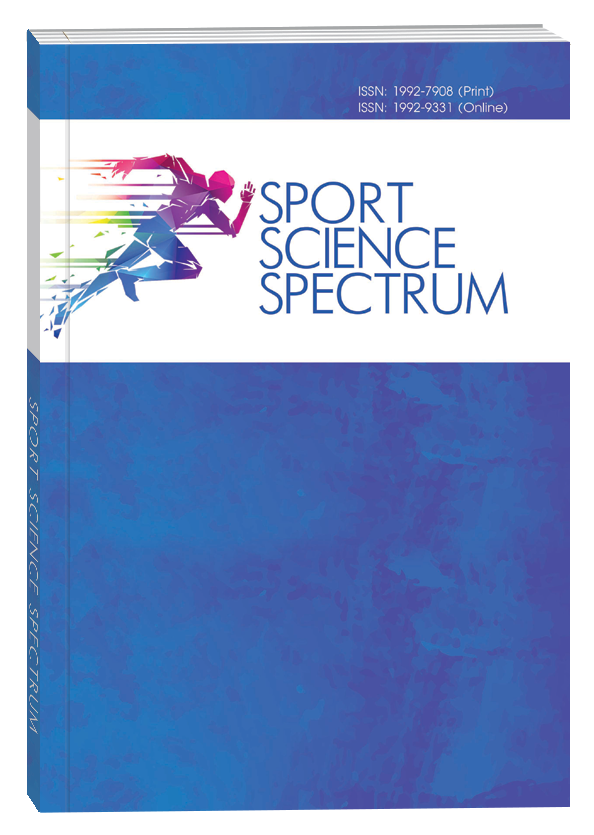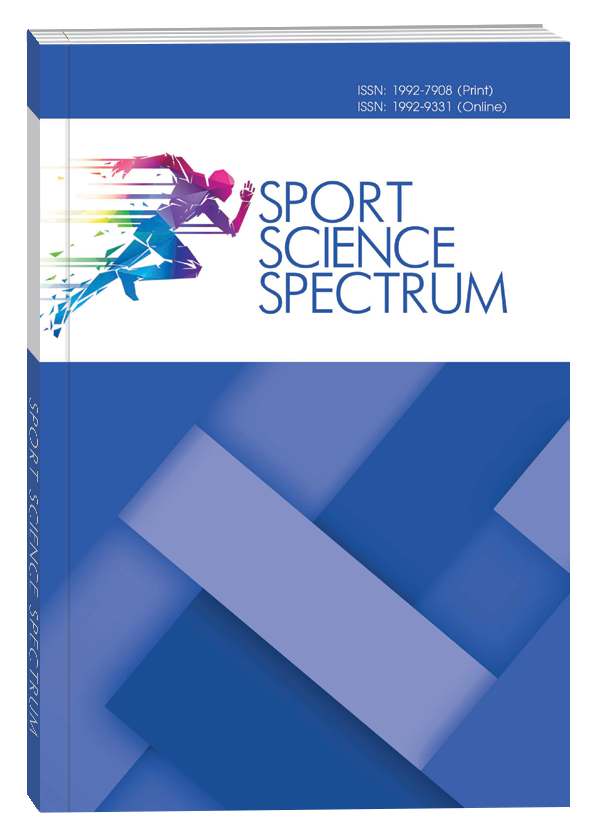TYPOLOGICAL DIFFERENCES IN THE FUNCTIONAL SUPPORT OF SPECIAL PERFORMANCE CAPACITY IN CANOEISTS
DOI:
https://doi.org/10.32782/spectrum/2024-3-5Keywords:
aerobic power, anaerobic power, energy capacity, functional support, specialized working capacity, canoe rowers, sports orientation, stage of preparation for higher achievementsAbstract
The results of selecting rowers require clarification on the ways to realize the existing motor and energy potential in accordance with the characteristics of energy supply during training and competitive loads at the stage of preparation for higher achievements. The purpose. Justify the typological differences in the functional provision of special fitness for canoe paddlers to be taken into account in the process of orienting sports training. Methods: Ergometry, gas analysis, blood lactate concentration measurements, and methods of mathematical statistics. Results: Canoe rowers aged 17–18 years (n=28) were divided into three typological groups, each with differences in energy supply structure. Five rowers formed group “A”. The typological feature of this group is the dominance of aerobic energy supply for specialized working capacity: VO2 max – 5.4±0.3 l·min⁻¹; VO2 max / kg – 69.0±2.5 ml·min⁻¹·kg⁻¹; La VO2 max – 11.4±1.0 mmol·l⁻¹. Four rowers formed group “B”. The typological feature of this group is the dominance of anaerobic energy supply: La 30 – 8.8±0.5 ml·min⁻¹·kg⁻¹; La 90 – 14.4±0.5 ml·min⁻¹·kg⁻¹. Nineteen rowers formed group “C”. The typological feature of this group is the combined dominance of aerobic and anaerobic energy supply: VO2 max – 5.3±0.1 l·min⁻¹; VO2 max / kg – 66.0±0.1 ml·min⁻¹·kg⁻¹; La 30 – 7.3±0.6 mmol·l⁻¹; La 90 – 13.6±1.4 mmol·l⁻¹. Conclusions. Specific characteristics of aerobic and anaerobic power, as well as energy capacity, formed the substantial foundation for energy supply in the specialized working capacity of rowers from different typological groups. Differences in the structure of functional capabilities determined the priority directions for sports orientation and individualization of training and competitive loads based on typological features of energy supply function.
References
1. Ван Вейлун, Русанова О., Дяченко А. Контроль функціонального забезпечення спеціальної працездатності кваліфікованих веслувальників з ура-
хуванням спеціалізації у веслуванні на байдарках і каное. Теорія і методика фізичного виховання і спорту. 2019. № 2. С. 92–100.
2. Го Пенчен, Кун Сянлінь, Дяченко А. Функціональна підготовка спортсменів у водних видах спорту. НПФ «Славутич-Дельфін», 2021. 243 с.
3. Русанова О.М. Теоретико-методичні основи управління тренувальними та змагальними навантаженнями у процесі підготовки кваліфікованих
спортсменів у веслуванні : автореф. дис. … доктора наук з фізичного виховання та спорту. НУФВСУ. Київ, 2024.
4. Платонов В.М. Сучасна система спортивного тренування. Перша друкарня, 2020.704 с.
5. Шинкарук О.А. Отбор спортсменов и ориентация их подготовки в процессе многолетнего совершенствования (на материале олимпийских
видов спорта). Олімпійська література, 2011. 360 с.
6. Diachenko A., Guo Pengcheng, Wang Weilong, Rusanova O., Kong Xianglin, Shkrebtiy Y. (2020) Characteristics of the power of aerobic energy supply
for paddlers with high qualification in China. Journal of physical education and sport. 20 (43). P. 312–317.
7. Diachenko A., Rusanova O., Guo P., Kong X., Huang Z., Guo J. (2021) Characteristics of the Special Physical Fitness of Paddlers at a Distance of 200 m.
Teorìâ ta Metodika Fìzičnogo Vihovannâ. 21(1). P. 43–49.
8. Guo Pengcheng, Rusanova O., Huang Zijian, Diachenko A., Rusanov A, Kiprych S. (2023) Programming modes of training sessions of qualified Kayakers
who specialize in the distance of 1000 m. Journal of Physical Education and Sport. 3(4). P. 32–40.
9. Guo P., Zhang Z., Huang Z., Kong X., Diachenko A., Rusanova O., Rusanov A. (2020) Features of the Canoeists’ Special Physical Fitness at the Distance
of 1000 m. 2020. Teorìâ ta Metodika Fìzičnogo Vihovannâ. 22(1). P. 106–112.





